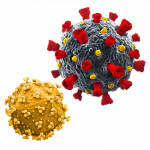People with HIV, even when they are on successful antiretroviral (ARV) treatment, have a greater risk of cognitive decline as they get older compared with what would be expected among the HIV-negative population.
Publishing their findings in the journal AIDS, researchers studied data on a cohort of 3,313 HIV-positive members of the AIDS Clinical Trials Group Longitudinal Linked Randomized Trials, a prospective cohort study of people enrolled in randomized trials of ARVs. They analyzed neurocognitive outcomes during at least the first two years after individuals started HIV treatment for the first time.
The median age of the cohort was 38 years old, with the middle two quartiles ranging between 31 and 45 years of age; 12 percent were older than 50. Forty-two percent were white and 20 percent were female. The median lowest-ever (nadir) CD4 count was 221.
During the follow-up period, the participants were on ARVs at 97 percent of their study visits. Ninety-one percent of all viral load tests taken were below 200 and 61 percent of CD4 cell count test results were greater than 500.
After adjusting the data for various factors and controlling for the expected effects of aging on neurocognitive performance (using norms from HIV-negative individuals), the researchers found that the odds of developing neurocognitive impairment at a follow-up visit increased by 18 percent with each extra decade of life. This effect began after individuals hit 40 years old.
Other factors associated with an increased risk of neurocognitive impairment at a follow-up visit included: hepatitis C virus infection, 40 percent increased risk; having less than a high school education, 37 percent increased risk; having a CD4 count below 350 and between 351 and 500, compared with having a CD4 count above 500, a respective 21 percent and 12 percent increased risk; being a woman, a 35 percent increased risk.
Factors not found associated with an increased risk of neurocognitive impairment included being an injection drug user, the drug class of an initial ARV regimen and the lowest-ever CD4 level.
To read the study abstract, click here.







1 Comment
1 Comment